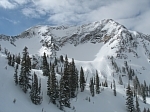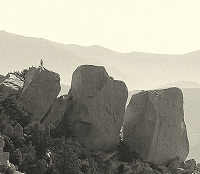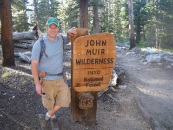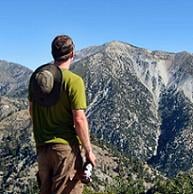Cool beans.
BTW, awesome signature quote. One of my favorite movies.
Hiking Baldy (and surrounding peaks) in Winter
-
Tim

- Posts: 560
- Joined: Tue Apr 08, 2008 8:55 pm
Wow, he was pretty lucky. Glad he's okay.asbufra wrote: He stepped onto some hard ice and almost immediately fell down; then he began that very slow yet unstoppable downhill slide on the ice. He was probably only going two miles per hour, but without an ice axe there was nothing he could do to stop.
I'm no expert and have no formal training but here are some general tips I've learned:
- I'm constantly reminded of the advice at the beginning of that British Mountaineering Youtube video: Avoid slipping in the first place. Develop good footwork and use your axe for support. Self-arrest should be a last resort.
- I'm constantly paying attention to how my feet feels. You can tell when your feet don't feel secure.
- On a steep climb, I usually don't move my feet until my axe is planted. I like having a secure point of contact before moving my feet. But, depending on conditions, sometimes you have to attack the slope in a faster way. If I need to rest, I'll kick in or cut a little platform.
- You are most vulnerable when you move in and out of a balanced stance. For example, when traversing diagonally across a slope you are most vulnerable when taking a step forward with your outside foot.
- You are very vulnerable when traversing directly sideways across a slope.
- Learn to self-arrest in the four different ways, but also repeat with your other hand. So that's 8 different ways. I admit I don't practice this as much as I should.
- When doing self-arrest practice at the bottom of Baldy Bowl, have someone be on rock watch. Even the bottom is not necessarily safe. I've seen big rocks roll all the way down past the Rock Garden at high speeds! Best time is early morning to avoid rock/ice fall.
- Mt. Baldy Rd can be a circus of snowplayers. There's only one way up and one way down that road. It's best to do your climb early and the hell out of there. My personal record is 2.5 hours in traffic to get down that road.
-
Ze Hiker

- Posts: 1432
- Joined: Mon Jul 28, 2008 7:14 pm
At what elevation was the snow threshold?titanhangman wrote: Thanks, Taco. I chose Bear Flat yesterday because I assumed it would be less inclined to present me with danger since it's more south/west facing. At least this early in the season. But I was astounded at the snow level, and how the route down had iced over as I was descending. I also worried about the snow wiping out the tracks leading down, and me having to route find in my condition. Thankfully it wasn't an issue.
-
titanhangman

- Posts: 75
- Joined: Mon Oct 26, 2009 2:18 pm
I'm not familiar enough with the trail to know that, but suffice it to say I went up past all the switchbacks above Bear Flat before I started hitting snow on the trail in earnest. There was patchy snow right after I got through the houses at the entry point, but it wasn't really on the trail except for in some of the shaded areas where it didn't melt off.
-
mcphersonm80

- Posts: 243
- Joined: Mon Aug 23, 2010 11:46 am
Taco wrote: Simonov, how about we organize a weekend get together for anyone who wants to do a general ascent of Baldy? Hike up to the hut, talk about stuff, go into the bowl, do self arrest and other training bits, then go to the summit. One of those kinda deals.
If anyone is interested, say yeah.
I'd join you guys 8)
-
Dave G

- Posts: 321
- Joined: Sun Jun 22, 2008 9:51 am
Just happened to see this post (I usually just look at the TR's) and thought I'd better clarify Norma's comments on my experiences with the microspikes. The reason I found them to be pretty useless on the day we were up there was because the few inches of powder covering the hard snow/ice was causing them to ball up. Once that happens, they become like short skis and you're better off with bare boots. This can occur with crampons too, of course, but the microspikes are very short (guess that's where the "micro" comes from) so it doesn't take much snow to render them ineffective. On ice and hard packed snow trails, i.e. low angled terrain, they do a decent job. Their biggest adavantage is that they go on and off quickly and can be used with any type of footwear. While I don't recommend doing this, Doug Thompson, owner of the Whitney Portal Store, actually climbed Baldy Bowl last winter with only micro's and trekking poles.  But that's just Doug...
But that's just Doug... 
The number one piece of equipment which will preserve your life when climbing in winter is not a helmet or crampons, but an ice axe and the knowledge of how to use it quickly and effectively. I think Taco's idea of an informal winter clinic to practice snow skills is great one and could well result in a life being saved or at least an injury avoided. Reading FOTH or watching a video does not substitute for actual experience, especially when you consider the many "personalities" snow has--sometimes changing dramatically from hour to hour--and how quickly your body can become converted into a high-speed projectile!
The number one piece of equipment which will preserve your life when climbing in winter is not a helmet or crampons, but an ice axe and the knowledge of how to use it quickly and effectively. I think Taco's idea of an informal winter clinic to practice snow skills is great one and could well result in a life being saved or at least an injury avoided. Reading FOTH or watching a video does not substitute for actual experience, especially when you consider the many "personalities" snow has--sometimes changing dramatically from hour to hour--and how quickly your body can become converted into a high-speed projectile!
-
HikeUp

- Posts: 4036
- Joined: Thu Sep 27, 2007 9:21 pm
Thanks for elaborating about the microspikes Dave. My experience with them is identical to yours. The spikes are useless unless they are in contact with the ice!
-
MattCav

- Posts: 356
- Joined: Thu Sep 23, 2010 4:13 am
this is all really good advice. thanks to everyone for posting; i find it helpful. im hoping ot experience my first crampon hiking experience in a week or two and everyone's thoughts are definitely being taken to heart  my friend natalie fell about 1000 feet down the baldy bowl towards the rock garden last year and it definitely showed me (and her) that the mountain reigns supreme. (fortunately she only had friction burns and a broken pinky. lucky girl)
my friend natalie fell about 1000 feet down the baldy bowl towards the rock garden last year and it definitely showed me (and her) that the mountain reigns supreme. (fortunately she only had friction burns and a broken pinky. lucky girl)
thanks again to everyone for posting. good stuff.
thanks again to everyone for posting. good stuff.
